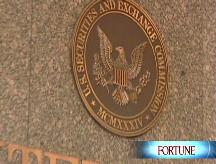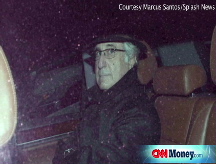Added insult to Madoff investors
Some people who got out of Bernard Madoff Investment Securities before it imploded may have to give back gains.
(Fortune) -- Should you be penalized if you were smart enough to pull your money out of Bernard Madoff Investment Securities before it imploded in what appears to have been a multibillion-dollar Ponzi scheme? That's only one of the depressing issues facing investors who put their trust in Madoff.
For starters, simply trying to fathom the assets and liabilities of Madoff's firm will be a Herculean challenge. "I don't think the extent of the losses is going to be known for months," says Stephen Harbeck, CEO of the Securities Investor Protection Corporation. "This is a completely different order of magnitude than anything that has gone before it, certainly in terms of brokerage firm failures or any other kind of financial institution fraud. This is a monster."
Any way you look at it, the only certainties will be time, litigation -- and pain. "It's hard to have a rule of thumb on this," says Robb Evans of Robb Evans & Associates. Evans was the receiver -- the person appointed by authorities to oversee the company while it's in government control -- for the Bank of Credit and Commerce International after it collapsed in a multibillion-dollar fraud and has also served as receiver in dozens of Ponzi schemes. "But the longer the Ponzi scheme has run, the less money is going to be available. Because the only way a long-running Ponzi scheme can keep going is by paying off early investors."
As Evans puts it, "The sad part of it is that it usually works out that your primary source of recovery is innocent people who put in their money early and got their money out -- and are asked to return it."
This is the legal notion known as "fraudulent conveyance," and it's a concept whose interpretation has recently gotten much more onerous for investors.
The basic notion is ancient, says Philip Bentley of New York-based law firm Kramer, Levin, Naftalis & Frankel. "It's an old concept going all the way back to back to Elizabethan times," he says. "The first case involved a man who transferred all his sheep to his wife to keep them out of the hands of people who were suing him. Nowadays, the classic case of a fraudulent transfer is a man who is being sued who transfers his house or his investment assets to his wife."
According to Bentley, it is long-settled law that some investors might have to give back some or all of their investment gains. But what has changed as a result of a federal court ruling in 2007 -- stemming from the faked results and misappropriation by the now-convicted managers of the $450 million Bayou hedge funds -- is that some investors might have to return some of their principal, too.
In the abstract, there's some logic here. Here's how Bentley, who represented 70 clients who had invested in, and then exited, the Bayou fund before its collapse, explains it: "The court ruled that because there was clearly a fraud going on at Bayou, and because arguably the redemption payment to investors furthered the fraud by fostering the illusion of profitability, the investors who took out their money were liable if they knew of the fraud or if they should've known of the fraud."
As Bentley puts it, "the first part -- having to give money back if they knew of the fraud -- is uncontroversial. Because if they were in on the fraud or had inside information, not many people would quarrel with the view that they should give money back. But what's problematic about the Bayou decision is holding them liable if they should've known; in other words, if they saw enough red flags that they should've investigated further."
In practice, that has meant different Bayou investors (again, among the ones who escaped profitably) have had to return differing portions of their money. Brad Alford of Alpha Capital Management advised an investor who had bought into the fund (when he had a different investment advisor, Alford is quick to note). "He got out with a nice 40% gain," Alford says, "and then the inevitable FedEx package arrived." It was a lawsuit filed by the Bayou receiver. In the end, says Alford, his client settled and gave back all the profits and half the principal because he was afraid he'd be deemed to have been on notice of Bayou's troubles (though he was not alleged to be privy to inside information).
Others have had to give back more or less depending on, first, their level of knowledge and second, when they pulled their money out of the fund. In the Madoff case, the statute of limitations will be six years, which means that any money withdrawn more than six years ago would not be subject to recapture by the bankruptcy court.
The notion of punishing people who "should've known" about a fraud is a process in which a guilty conspirator can be confused with an honorable and intelligent person who protects his interests.
"There's going to be a very big policy issue at stake," Bentley argues. "You're penalizing the investors who were savvy enough to see the warning signs that others overlooked... And the question is, especially in today's world, when you've got a financial crisis caused by people being blind to risk, do you really want to put in place a legal rule that penalizes investors who were savvy about risk and did something about it?" ![]()
-
 The retail giant tops the Fortune 500 for the second year in a row. Who else made the list? More
The retail giant tops the Fortune 500 for the second year in a row. Who else made the list? More -
 This group of companies is all about social networking to connect with their customers. More
This group of companies is all about social networking to connect with their customers. More -
 The fight over the cholesterol medication is keeping a generic version from hitting the market. More
The fight over the cholesterol medication is keeping a generic version from hitting the market. More -
 Bin Laden may be dead, but the terrorist group he led doesn't need his money. More
Bin Laden may be dead, but the terrorist group he led doesn't need his money. More -
 U.S. real estate might be a mess, but in other parts of the world, home prices are jumping. More
U.S. real estate might be a mess, but in other parts of the world, home prices are jumping. More -
 Libya's output is a fraction of global production, but it's crucial to the nation's economy. More
Libya's output is a fraction of global production, but it's crucial to the nation's economy. More -
 Once rates start to rise, things could get ugly fast for our neighbors to the north. More
Once rates start to rise, things could get ugly fast for our neighbors to the north. More









